Text
In this post, we will see some interesting trends and innovations for the modern digital workplace. Our guide will show you practical steps for implementing these changes and keeping your workplace at the forefront of the digital age.
0 notes
Text
Role of SAP during Digital Transformation Journey

Importance of Digital Transformation in Today's Business
It is becoming increasingly evident for businesses that in order to expand and compete, they must take actions to improve their resilience, competitiveness, and responsiveness. To meet the ever-changing customer expectations for personal service and fulfillment, organizations must adapt and develop their digital environments—from the earliest phases of raw materials to supply chains—as well as update and establish traditional business models.
Today's organisations are more concerned with how quickly they can embark on their digital transformation path than whether or not they will need to adopt digitalization in order to survive in the present business environment.
What Are The Challenges in Digital Transformation
Lack of an SAP Business Transformation Strategy
Without a set strategy, and SAP digital transformation project cannot be successful. Know what has to be upgraded and where your organisation may be enhanced, and then start there.
Improper IT Skills
You'll need a knowledgeable, effective IT workforce if you want your SAP digital transformation efforts to be successful. And putting that together is challenging, particularly given the present shortage of expertise
How SAP Enables Digital Transformation
Business processes and analytics are combined by SAP Business One to create a reinvented digital core that integrates business ecosystems in all the major areas of your company. It may be set up on-site or in the cloud and provides real-time, intelligent insights for better decision-making and simplified customer management.
The Role of SAP in the Digital Transformation Process
When it comes to digital transformation, SAP’s importance cannot be overstated. While the opportunities for digital transformation vary depending on business strategies and needs, shared benefits can be realized by implementing an SAP solution.
Achieving Integration with SAP Digital Transformation Framework
Deliver a successful digital transformation strategy by following the 5 below-mentioned key steps.
Check your company’s current state
The first step in determining your business capability is to assess your current assets and business systems. Assessing your competitors, market, and present position within it are also important at this time
SAP Digital Transformation Benefits
Every level and function in a company can be integrated through SAP digital transformation. Intelligent technologies provide businesses with the fundamental resources they need to succeed
Deeper insights for informed and real-time decision-making
For many businesses, assessing performance and ROI has often been a TIME-TAKING process. By the time data is gathered, processed, and manually analysed, it gets too late.
Work With Trusted SAP Partner to Deliver New Business Value
With a deeper knowledge of SAP solutions, Silver Touch can assist our clients in undergoing a digital transformation with SAP, unlocking significant business innovations and opening up fresh growth prospects that help them outpace the competition.
Please Read here for more details:
0 notes
Text
Understand the Importance of SAP Business One for your Business

SAP Business One is the most powerful ERP solution available for small, medium, and large-scale growing companies. That's because it allows an integrated view of the entire business — order to cash, procure to pay, CRM, SCM, Production, Projects, In-process Quality Management, MIS Dashboards — and easily adapts to meet the necessary changes in a company.
In this article, we will discuss the importance of SAP in business and the key benefits of SAP Business One (SAP B1). But, before moving forward, let’s have brief information on SAP Business One.
Let's Understand the Different Challenges Faced by SMEs.
The importance of SAP in business can be understood by looking at the SAP Business One benefits and its ability to address different challenges of SMEs. Here are some of the major challenges faced by SMEs.
Lack of centralized application for managing different processes
Inability to get accurate data in real-time
Inability to access the corporate data on the move or from remote locations
Issues related to customer services and inventory management
Difficulties in optimizing various processes and cash flow
Lack of collaboration between various departments of the company
How does SAP Make the Solution Different?
Advancements in Analytics, cloud technologies, mobile technologies, big data, machine learning, and IoT make SAP Business One capable of managing multiple processes effectively. SAP B1 has various modules for handling operations of various departments including purchase, sales, project & resource management, production, accounting, administration, and inventory.
The importance of SAP in business is increasing because of integrated modules and enhanced capability. It can unify the departments by centralizing the corporate data. What makes SAP B1 highly important across the spectrum of industries is its capability to interconnect the departments of the same enterprise and show insights for better decision-making. Let’s discuss this in detail.
Understand the Importance of SAP Business One
Decentralization can create hurdles in managing processes especially when your company has adopted a diversified business model. It is difficult to monitor, plan, and manage processes in such a scenario. Here, SAP Business One comes into the picture.
Whether you are running a small or midsize enterprise, SAP Business One provides users with a centralized platform to collect data from various departments. It not only accelerates the speed of getting insights but also enhances the decision-making process.
Why does your Business need SAP Business One?
There is no exaggeration in mentioning that SAP Business One is way different from other ERP software available in the market. It acts as a single application for all complex business needs and diversified processes. Here are some of the key reasons why your business needs this software-
Ready to Implement SAP Business One?
Are you ready to drive your company toward growth? Do you think SAP Business One is capable of taking your company to a new level? If yes, then the time is right to take the first step of finding the right SAP partner. You need a reputed company that can make the SAP B1 implementation seamless and straightforward.
Key aspects you should consider for successful SAP B1 implementation are the budget, resources, and flexibility while managing the project. The scope of the implementation project includes the answers to the following questions-
Please Read here for more details:
0 notes
Text
Importance of SAP Business One in the Wholesale Distribution Industry
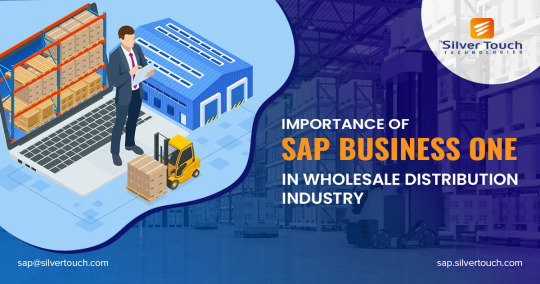
The wholesale distribution industry is constantly evolving, with new challenges and opportunities emerging every day. To stay competitive in this fast-paced industry, wholesale distributors need to manage their operations efficiently and effectively
Common Challenges Facing Distributors and Wholesalers?
Wholesale and distribution
Thanks to the SAP Business One system, you can improve your entire business management, from demand planning and inventory management to logistics management. You achieve optimal commercial services thanks to integrated and flexible processes.
Retail and Stores
Thanks to SAP Business One, you can offer your customers products, information and a personalized shopping experience, whatever the channel. With real-time customer and point-of-sale data, you increase customer engagement, from marketing to logistics.
Industry specific business software
Silver Touch has developed specific applications (add-ons) for wholesale and retail trade and distribution: from a tailor- made checkout system, through a salesmate sales application, to applications to create more efficiently collections with different sizes and colors.
What are the main challenges of the Wholesale Distribution Industry on a daily basis?
Bureaucracy
Wholesale distributors need to be aware of current legislation, so that legal problems do not arise, the company's reputation declines, and even the risk of closure. So, be sure to comply with sanitary control regarding the facilities and storage of products, which tend to have more contamination problems than many other Industries.
SAP Business One's Key Features for Wholesale Distribution
Order management - manage cash - from customer orders, set up deliveries and update stock balances for invoices and payments or collections
Inventory management - across multiple warehouses using FIFO, moving average or standard costing
Inventory tracking - moving between warehouses, including shipments, shipments and other orders; performing inventory and counting cycles
How SAP Business One Benefits Wholesale Distribution
Efficient order management does not allow you to lose trading opportunities; shorter cycle time improves cash flow and inventory turnover
Immediate return on investment - in most warehouse management and distribution scenarios, freeing up the cash that is associated with excess inventory.
Improved gross margin - thanks to flexible price lists by date/volume/customer and gross margin approval procedures, efficient decision-making process due to greater visibility and real cost of orders
Greater visibility into inventory, sales, lead tracking capabilities, profit targets, ranges and areas to instantly measure business performance, improve forecasting
How does a SAP Business One help a Wholesale Distribution Industry?
As mentioned, a Wholesale Distribution Industry faces numerous challenges that can directly interfere with its sales volume. For this reason, there are management systems that help the industry overcome such obstacles, especially those related to logistics, such as SAP Business One. This is because there are numerous steps to be developed in the distribution. One of the benefits of the software is that they are organized by business area and prioritized, such as:
Inventory control
Management of orders and sales orders
Financial management
Delivery logistics
Issuance of invoice and bank slip
Important indicators for monitoring
Please Read here for more details:
0 notes
Text
SAP ERP Software for Education Institutes- Benefits & ERP Modules
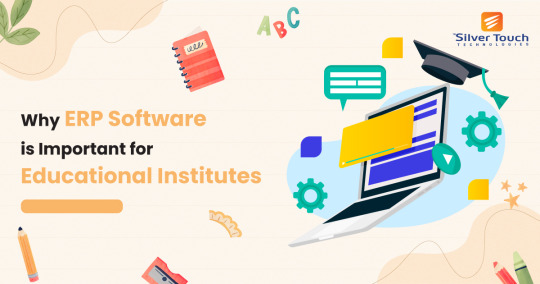
Why ERP In The Education Sector
The software automates every crucial school process, so you can count on it for operations like searching for admission, fees, HR, admin, or recruitment. The ERP solution has advantages for every department and institution.
Moreover, organizations can streamline every single business procedure in the education sector. Therefore, it does everything if you're looking for a single piece of software that can manage everything by automating company's operations. Additionally, it manages payments, audits, payroll, document processing, and many other things.
Role of an ERP for Educational Institutions
A More Accessible Learning Environment
For advanced educational institutions, providing high-quality education alone is insufficient. Institutions must implement an ERP that supports students' full functioning and satisfaction
Benefits of Implementing ERP in Educational Institutes
Streamlined Management
Access to information concerning students, staff, timetables, exams, admissions, fees, reporting, and other issues is made simple and swift by the education ERP system. By doing this, management is able to analyze and evaluate numerous areas of the organization, which improves planning. Through strategic data analysis, expanded data access also fosters informed decision-making.
Simplified Resource Monitoring
Manual management of enormous resource databases is eliminated by an effective ERP system. The software's ability to manage real-time inventory and resource utilization enable you to seamlessly distribute resources, improve operations, and keep an eye on all of the institution's activities. Thus, daily tasks are expedited and problems are resolved quickly.
Data Centralization
Numerous records regarding students, books, exam schedules, lesson plans, and other data must be kept privately and securely. An ERP solution unifies the entire campus and all of the branches into a single system to simplify the data management process.
Why SAP is the Best ERP for Educational Institutes
Track Grant Revenue Easily
Grant budgets can be readily managed with SAP Customer Experience, an all-in-one integrated solution. With SAP S/4HANA, the payment process can be made more efficient. Budgets can be followed, and payments can be made more promptly and accurately.
SAP ERP Modules for Educational Institutions
Admission Management
Streamline and automate the admissions procedure for the educational sector. Use a cloud education ERP to ensure that your school, colleges, and university admissions process are error-free.
Fees Management
Obtain useful information, such as dues receipts and fee waivers. By monitoring fee collection and management, you can save a lot of time and work.
Alumni Management
Organize all the pertinent information on alumni. Make sure the data is up to date and accurate using the education ERP system.
Please Read here for more details:
0 notes
Text
Top ERP Implementation Partner Selection Criteria – Cost & Benefits of ERP Implementation
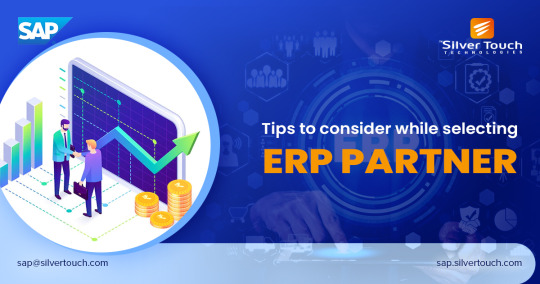
Choosing The Right ERP Partner- ERP Implementation Partner Selection Criteria ERP (Enterprise Resource Planning) software is the foundation of today's businesses. The agility provided by a modern ERP system backed by well-honed processes is what makes a business run successfully
Why Do You Need an ERP Implementation Partner?
ERP implementation, if not done by professionals, can be extremely time-consuming and costly that will affect every aspect of your business. Many in-house IT teams lack the expertise to implement a new ERP, and there's also a chance you won't have enough capacity to deploy the chosen ERP. An ERP software solution provider could work with your company to determine its needs and set up a cost-effective and high-performing ERP system
Choosing The Right ERP Partner- ERP Implementation Partner Selection Criteria
1. Go through the existing processes and problems
Document the ERP success partners' current processes, strengths, and problems. Examine their ongoing system's shortcomings, as well as what procedures could be enhanced and how to achieve them.
Understand ERP Implementation Cost
Considering the average number of users a system may have, an ERP deployment for a small-to-mid-sized business can cost an average of $20,000 for 10 users
Benefits of ERP Implementation
Enhanced Business Reporting
ERP works as a reporting tool with real-time information for the business processes. It works as a centralized source of truth – one integrated database for all business-related information.
Better customer service.
Get quick and easy access to customer information and attain faster response times. Enhance on-time delivery and customer satisfaction along with improved order accuracy.
Improved Inventory Costs
Only store the required amount and avoid any unnecessary wastage of resources. With the help of this, businesses will be able to dodge both- higher overhead costs and longer customer fulfilment times.
Why ERP Implementations fail?
It can be challenging to identify the precise reason for ERP failure, even with the advantage of going back in time to examine the game tape in slow motion. However, following are the main core causes of ERP failure are commonly seen by businesses:
Unaligned structure
The issues listed above are likely to arise if your team isn't complying with what this digital transformation means for your business and how it fits into a larger plan. The project team simply cannot have a clear direction and will find it difficult to reach agreement on choices in the absence of alignment from the top of the organisation.
Internal bias
One of the most frequent underlying reasons for ERP failure is internal bias. Everyone has biases because we are all human, but the issue is made worse when you have many counterparties who are operating in their own economic self-interest rather than your own.
Which ERP Implementation Methodology Is Right for Your Business?
To maximise your chances of effective ERP implementation, it is crucial to choose the best implementation strategy. The following are the top three methods for implementing ERP:
Waterfall
is frequently regarded as the "classic" method, featuring a highly structured project schedule and gates for forwarding between different stages. Choose if- Projects with high complexities will are an ideal fit for a structured approach of Waterfall methodology. This method clearly defines deliverables and let them flow from top to bottom just like a waterfall.
Agile
It is a latest ERP implementation strategy that aims to sprint-deliver production-ready software in small increments. Choose if- Agile methodologies are preferred for early user feedback and acceptance of the solutions. It provides ongoing users to interact so that they get adapted to the solution.
Please read here for more details:
0 notes
Text
SAP Inventory Management: Ultimate Guide of Pricing, Benefits & Features
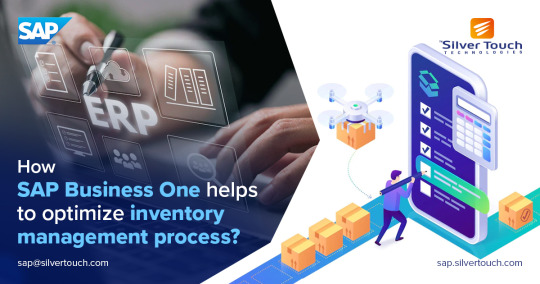
What is SAP Inventory Management?
The standard practice of controlling inventory flow is known as inventory management. It consists of various processes. These processes include
Data Monitoring
It involves collecting information on inventory levels for various items and changes in these levels during various periods.
Data Interpretation
It is known as generating action items or actionable insights based on the collected data for making real-time decisions.
Execution based on Action Items
It includes assigning actionable insights to the team and executing the strategy to maintain the inventory levels.
Common Inventory Management Challenges
Every day, wholesale distributors face numerous issues or challenges in managing inventory. These challenges eat up a lot of time and effort of employees frequently. As a result, entrepreneurs have to witness poor workflow management and reduced profits. Here is a list of the most common inventory management challenges.
Tracking Difficulties
Enterprises find it difficult to track the movement of raw materials and finished goods. The manual process of tracking inventory is time-taking and cumbersome, and companies have to allocate some employees for this task every day.
Supply Chain Complexities
Supply chain management is another big challenge for modern organizations. As multiple departments including procurement, production, and finance are directly related to the supply chain, it remains complicated to manage for companies.
Improper Management of Orders
Manual order management is a time-consuming process and as companies grow in scale or size, it becomes more difficult to manage orders for the order or sales department. Such manual order management is subject to human errors.
SAP Business One helps Overcome Challenges in Inventory Management
SAP Business One inventory management can improve the management of the stock or goods by promoting best practices. Warehouse and production teams can get real-time data on an easy-to-use dashboard for managing processes effectively. Sales and customer service departments can also get real-time information about the availability of items and improve customer experiences while increasing sales.
Benefits SAP Inventory Management System
Inventory management capabilities of SAP Business One assist businesses to streamline their inventory-related procedures effectively. SAP inventory management module offers many benefits to companies while enabling them to convert the inventory management process into a highly efficient and strategic part of their core operations.
SAP Business One Inventory Management Best Practice
SAP Business One software can enhance the inventory management capability of any enterprise by following the best practices. Here are the ways through which companies can manage inventory in a better way.
Please Read here for more details:
1 note
·
View note
Text
SAP Business One vs SAP Business ByDesign: Choose the Best ERP
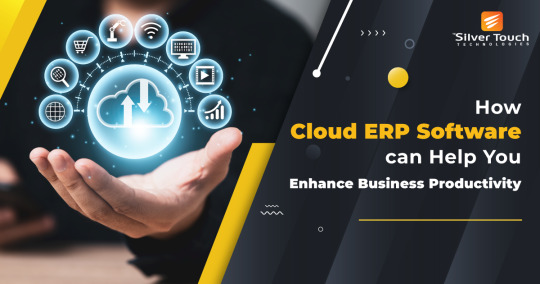
SAP has extensive experience of over four decades in providing ERP solutions for small and mid-sized industries across different sectors. This German business application development company has successfully integrated technological advancements in future-proof cloud ERP solutions for modern businesses.
In this article, we are going to see the difference between SAP Business One and SAP Business ByDesign solutions.
Overview of SAP Business One & SAP Business ByDesign
SAP Business One vs. SAP Business ByDesign
Many entrepreneurs consider SAP B1 and SAP ByD as twin solutions for businesses. However, the reality is, both these ERP solutions have some differences. Let’s go through the key aspects of the difference between SAP Business One vs. SAP Business ByDesign.
Number of Users
SAP B1:It is useful for small to lower-mid-sized businesses. Five to fifty users can leverage the benefits of SAP Business One easily.
SAP ByD: Upper mid-sized enterprises that are looking to scale and manage subsidiaries can use SAP ByD. Anywhere between 20 to 1500 users can utilize this platform.
Type of Industries
SAP B1: Best fit industry sectors are manufacturing, retail, distribution, eCommerce, trading, and services
SAP ByD: Most useful in manufacturing, construction, software, IT, consulting, chemical, medical, distribution, and services
Implementation Time: SAP B1 vs SAP Business ByDesign
SAP Business One
The typical SAP B1 implementation without add-ons takes up to three months. It is because of this solution’s long and proven history as well as a robust SAP Partner network. Here, it is fair to mention that the implementation of industry-specific add-ons can increase the time based on the depth and complexity of add-ons. As SAP Business One is an easy-to-learn platform, the training time is negligible.
SAP SAP Business ByDesign
It normally takes four to eight months to implement because its customized add-ons require extra effort and time to integrate. Compared to SAP B1 add-ons, the same for SAP ByD take more time to integrate.
Which is The Best For Your Business: SAP B1 vs SAP Business ByDesign?
SAP Business One and SAP Business ByDesign are robust, mid-market ERP solutions with slightly different functionality and scope. On one hand, SAP Business One addresses the needs of small to mid-sized companies that seek core ERP capabilities.
Companies with limited budgets for ERP integration also opt for SAP Business One as it is a cost-effective solution. On the other hand, SAP Business ByDesign meets the larger requirements of enterprises. Companies that want an ERP solution that takes care of subsidiaries and manage multiple legal entities opt for SAP Business ByDesign.
Business Process Flexibility: SAP B1 vs SAP Business ByDesign
Here, the basic point to consider in SAP Business One vs. SAP Business ByDesign is SAP B1 is fully customizable and extendable using add-ons, whereas SAP ByD is not customizable but is extendable with the help of add-ons. Let’s understand the difference between these two solutions from the perspective of flexibility.
Please Read here for more details:
0 notes
Text
Maximizing Business Efficiency with Cloud ERP: Features, Deployment, Advantages
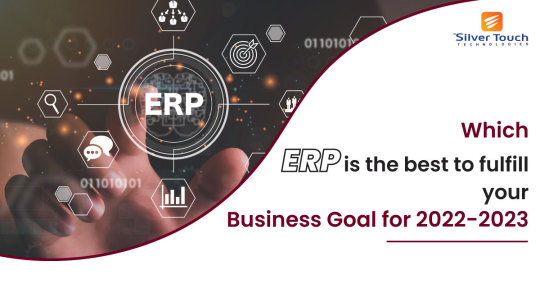
How Does Cloud ERP Work?
A reputed research firm IDC has mentioned that the demand for cloud-based ERP systems continues to grow because these systems can access and analyze a huge amount of business data in near real-time. Be it getting inventory insights or accessing financial data for auditing, cloud-based ERP solutions are ready to assist your company irrespective of its size and scale. Here is how the Cloud ERP solution works.
Different Types of Cloud ERP Software
Third-party providers or ERP vendors host the ERP solutions in their data center and their customers can use these solutions using the Internet. However, it is necessary for you to ask Cloud ERP providers for the types of cloud platforms
Private Cloud ERP
It is a single instance of the ERP solution that runs on a private cloud infrastructure. Here the underlying infrastructure is ‘hosted’ by the third-party vendors and cannot be shared like a single tenant SaaS.
Single-tenant SaaS ERP
It facilitates every user to get their own slice of the ERP software. Here, the software runs on the cloud provider’s platform but the customers can get flexible computing power and the advantage of subscription-based pricing
Components of Cloud ERP Software
Customized cloud ERP solution has many innovative and enterprise-friendly features. It covers all the departments of your company. Here are the top six components you should look for in cloud-based ERP software.
1. Human Resources(HR)
This component takes care of the full spectrum of employee management ranging from onboarding to offboarding.
2. Business Intelligence (BI)
Though this is a relatively new component of the cloud-powered ERP solution, it becomes quite popular in the current competitive business scenario. It assists companies in driving decision-making processes.
Benefits of Cloud ERP Software
The ERP software has a massive architecture that contributes to increasing productivity while improving collaboration among all departments. Here are the top benefits of ERP software.
Centralized System
Decentralization is not good when it comes to the flow of business information. It fails to give the whole picture of business processes at any given point.
Cloud-based ERP is Suitable for Small Businesses?
We will start with the prevalent notion- ERP solutions are for large-scale enterprises only. This is not reality these days as technology has evolved to make ERP solutions ready to help SMBs and even startups.
What are the Factors to Consider When choosing ERP Software?
ERP software offers many benefits to your enterprise, but you need to consider various factors to choose the right ERP solution. Here are some of these factors that can assist you to optimize your ROI over the period.
SAP Business One ERP Costing
The cost of SAP Business One ERP Cloud/SaaS inclueds licensing fees, implementation cost, data migration, user training, and support charges. Though an experienced and reputed SAP Partner can give a better idea about SAP Business One ERP Cloud costing, here we give a brief outline of the calculation.
Please Read here for more details:
0 notes
Text
Which is the Best ERP System? ERP Deployment & ERP Software Cost
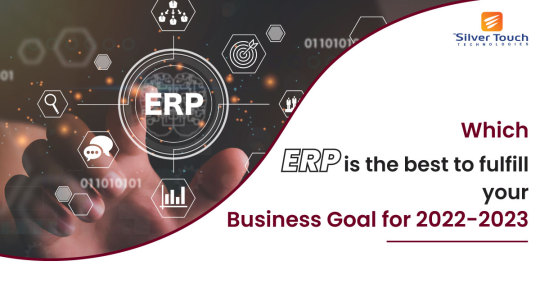
Here, small businesses' Best ERP system comes into play. An ERP (Enterprise Resource Planning) solution enables you to run your entire company from a single platform.
A robust ERP system can manage all aspects of a business including planning, procuring, ordering, production, sales, inventory, supply chain, accounting, human resources, and customer services. You can leverage the benefits of the top ERP system as a fully-integrated platform for optimizing core processes. What’s more, SMBs can readily integrate financial and customer information into one system with the help of ERP software.
In this article, we will discuss the importance, benefits, and types of ERP and find out which is the best ERP system for your company to fulfill its goals. But before moving ahead, let’s understand the definition and mechanism of ERP software.
Why do Companies Need ERP Systems?
Investing in the top ERP software can give high ROI in a short time. An advanced ERP system not only assists enterprises to bring various activities on a single platform but also contributes to streamlining core processes. Here are five big reasons why your company should invest in ERP software.
Improved Accounting
When it comes to financial reporting, accuracy and real-time availability can be game changers. Cloud-based ERPs like SAP ERP can provide an efficient centralized system for complex transactions. Repetitive data entry work can be managed effectively and companies can get high visibility of operational data using ERP.
How do ERP Systems Work?
ERP systems or ERP suits consist of integrated modules or applications. These modules are interconnected and share a common database. Each module focuses on a specific business area and is capable of working in sync with other modules using the same data.
Key Benefits of The Best ERP Software
An ERP system with desired features and seamless performance can offer many benefits to modern enterprises. However, it is fair to mention that the benefits of a cloud subscription model are somewhat different than that of an on-premise model. Here we mention the top business benefits offered by all advanced ERP solutions.
Increased Productivity
Companies can increase productivity and efficiency by streamlining core processes. An ERP system not only streamlines processes but also brings automation to them. As a result, you can enable your staff to accomplish more tasks with less effort. Companies can easily meet the deadlines for projects even with fewer resources.
Advanced Reporting
An ERP system gives detailed reports on business and financial processes in real-time. What’s more, you can easily share them as and when necessary among your team members. The company’s management can make informed decisions and take measures to improve performance based on these reports
Important Things To Look For in an ERP System
A modern ERP system has many capabilities in line with the industry sector they serve. It is, therefore, necessary for you to look for ten basic features in the top ERP software. These features include-
Embedded Analytics- Features like built-in analytics, reporting, and compliance tools can deliver intelligent insights for your business.
Data Visualization- Visual representation of your company’s data on an interactive
Consistent UI/UX- All modules should have the same look and feel along with easy-to-use personalization tools.
Choose the Right SAP Partner
As a reputed SAP partner, Silver Touch Technologies offers end-to-end SAP services and solutions for businesses of all scales. We offer SAP cloud solutions, SAP mobility solutions, SAP custom solutions, and 24x7 support services.
We also provide our esteemed corporate users with SAP Business One implementation, licensing, and add-on development services. You can get high-quality add-ons for quality control, manufacturing, chemical, HRMS, payroll, and sales order processing in a cost-effective way.
Please Read here for more details:
0 notes
Text
Importance of ERP System for Streamlining Business Processes
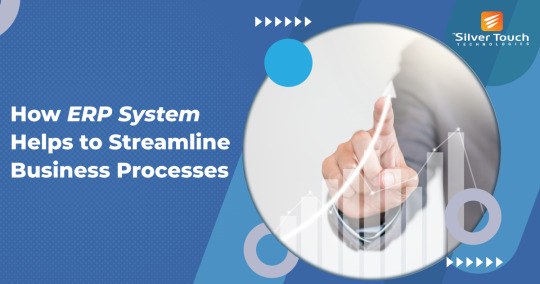
An Enterprise Resource Planning (ERP) system plays a crucial role in driving business toward growth. On one hand, it streamlines and automates several processes and on the other hand, it enhances overall productivity by offering real-time reports on various operations. In this article, we are going to discuss the importance of ERP systems in modern businesses.
Importance of ERP in Business
A feature-rich ERP software can manage many functions effectively. You can count on a robust ERP system for handling daily operations and reaching your business goals. Let’s discuss the top factors that show the importance of ERP in any business irrespective of its size and location.
Collaboration
An ERP system brings and supports centralization. In other words, all the information from every department is stored in a database that is accessible through an ERP system
Productivity
An ERP solution can handle multiple tasks including timesheet tracking, order processing, and reporting. Such tedious tasks can take a lot of time for employees, but with an ERP system in place, you can automate them to increase overall productivity.
Why Do Companies Implement ERP Systems?
Today, a challenging business scenario and growing competition compel companies to increase productivity and efficiency while maintaining a high quality of services and products.
Here, an ERP system lends a helping hand by streamlining business processes, automating several daily tasks, and increasing overall visibility.
Stay Updated
ERP systems are flexible, scalable, and upgrade-friendly. All these characteristics are necessary to drive growth for your business.
Get Single System
A tailored ERP solution can manage all core areas of your business. Let’s understand this with the example of a manufacturing
Find the Right ERP for Your Organization
Here it is necessary to mention that you need to find the right ERP to leverage all these benefits. You can determine business objectives and identify requirements before implementing an ERP solution. Today, many options are available in the market to meet your business needs, but then, you need to find the most suitable solution to get a high ROI.
Conclusion of Importance of Enterprise Resource Planning
Some business persons may argue that ERP implementation cost is high, but the importance of an ERP system outweighs this cost and effort. All you need to choose the right ERP solution for your enterprise
Please Read here for more details:
0 notes
Text
Importance of ERP Software Customization- Key Points to Consider
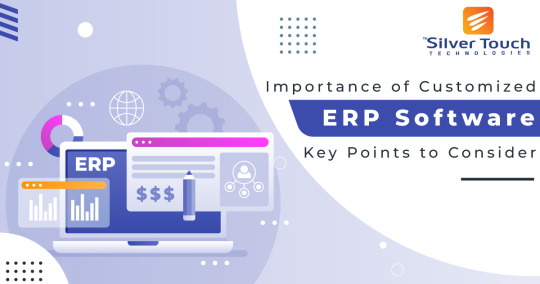
Reasons Why You Should develop a Custom ERP System for Your Business
An Enterprise Resource Planning aka ERP system consists of various digital modules for business management. Simply put, an ERP system can provide an overview of all daily operations across different departments of your company using a set of modules.
Here are three big reasons why your organization needs custom ERP solutions.
Many applications for different processes
Enterprises tend to use multiple applications at once for managing different processes every day. This practice not only takes more time for employees but also takes its toll on overall productivity. For example, one app stores the client’s data, and the other app takes care of the ordering process
Benefits of Customized ERP Solutions for Your Business
Custom ERP software development is aimed at making the most of centralizing business processes. Here are some of the noteworthy business benefits of customized ERP solutions.
Enhanced Visibility
Custom ERP software makes data available for the top management and employees to offer total visibility. You can monitor the ordering process, manage supply chains and track production efficiently using the ERP solution.
Reduced Operational Costs
A custom-built ERP system can bring automation in repetitive tasks and save the efforts of employees. It can increase the efficiency and productivity of your workforce and reduce operational costs while increasing the flexibility of your business model.
Real-time Reporting
A reputed custom ERP software development company focuses on adding all the necessary features in the bespoke solution. One such feature is real-time reporting of every business process across all the departments of your company.
How ERP Customization Can Lead to Major Issues
If you want to leverage all the business benefits, it is crucial to close functional gaps between your business requirements and the ERP solution. This approach is known as customization. It is necessary for you to know some of the major issues related to ERP customization before implementing it.
ERP customization needs third-party products but this can cause problems because ERP customers have to get additional functionality from authorized partners or independent service providers instead of the maker of the ERP software. While implementing a customized ERP system, if any issue occurs, a third-party vendor or an official partner has to resolve it. However, it is fair to mention that if this solution is provided by independent developers, it can create many issues related to compatibility.
When Should You Customize ERP Software?
Gone are the days when manufacturers and distributors had to spend a lot of money implementing ERP software. Also, customizations in the existing ERP solutions brought budgetary overruns and increased complexity.
ERP Customization in a System Implementation
Custom ERP solutions can improve business operations across the board. But, it is necessary to make a roadmap that contains process improvement opportunities before implementing an ERP system. In other words, ERP customization needs a systematic approach and some knowledge-sharing policies for successful implementation.
Model and reporting walkthroughs, team workshops, and detailed flow charts are helpful in sharing the data. You can also define and use KPIs to measure the outcome of an ERP system accurately. All these tactics are useful for implementing custom ERP software into your business system profitably.
Please Read here for more details
0 notes
Text
SAP Business One VS NetSuite – ERP Comparison – Choose the Right ERP Software

We will discuss different aspects of SAP B1 vs NetSuite. But, before that, let’s understand this business management software.
Business Management Software – SAP Business One & NetSuite
Modern businesses consist of many interrelated and yet diverse operations. You just cannot separate one process from another while understanding the business model. For example, if you want to streamline the accounting process, it is necessary to analyze the financials and inventory operations.
SAP BUSINESS ONE vs. NETSUITE- HISTORY
SAP Business One
SAP ERP solutions have been around us since the 1970s. SAP, along with its global partners, has come up with many industry-specific solutions over the period. SAP ERP solution covers all the major industry sectors including manufacturing, retail, energy, public service, retail, and finance
Oracle NetSuite
Founded in 1998 and acquired by Oracle in the year 2016, NetSuite has gained fame as the first cloud-based ERP solution. With an impressive track record, Oracle NetSuite has over 24,000 corporate clients across more than 100 countries globally. Initially, it was accounting software, but gradually it expands to include core business areas including supply chain management, procurement, finance, order management, and the like.
SAP vs. NetSuite: DEPLOYMENT OPTIONS
SAP Business One
SAP Business One is a flexible, cloud-based, hybrid ERP solution. Companies that want to migrate all their processes to the cloud or want to manage some operations on-premise and some using cloud can leverage the benefits of SAP B1.
Oracle NetSuite
NetSuite, on the other hand, is a 100 percent cloud ERP solution. While talking about SAP Business One vs. NetSuite, we need to keep in mind that NetSuite is a strictly cloud-based ERP solution while SAP Business One is a hybrid solution (both cloud and on-premise).
COMPARE SAP BUSINESS ONE AND NETSUITE - Implementation Challenges
SAP Business One
You can save a lot of time and amount in implementing an ERP solution with the help of an SAP Partner. SAP Business One Partnership Program is designed to offer customized implementations to meet diverse business requirements. Add-on implementation assists companies to meet specific needs.
Oracle NetSuite
Oracle NetSuite opts for outsourcing direct implementation. At times, it remains cumbersome due to difficulties in scheduling meetings with offshore resources. Another nail in the coffin is the fixed implementation fee structure. It brings some challenges like lack of commitment and proper timing of implementation.
NETSUITE vs. SAP BUSINESS ONE- Deployment Costs
SAP Business One
SAP Business One Cloud comes with Amazon Web Services (AWS). It scales up in line with the growth of your business so that you can focus on productive activities and innovative measures. SAP Business One Cloud gives real-time insights from all departments to enable entrepreneurs to make informed decisions from anywhere.
NetSuite
The NetSuite starter edition, on the other hand, has limited features and companies have to purchase features as add-ons. SMBs that want a cost-effective ERP solution may have to compromise on basic out-of-the-box features while opting for NetSuite.
Please Read here for more details:
0 notes
Text
How ERP can Transform Trading into More Profitable Business in 2023

How Will Silvertouch Help You to Solve The Challenges of trading ERP software?
The trading and distribution industry has to cope with intensifying competition and changing requirements of customers. Based on these factors, we can identify the following challenges of trading business.
Bringing Transformation
Digital transformation is the need of the hour for trading companies. The advent of Industry 4.0 and advancing technologies have disrupted the trading industry and traders must make their business model ready for digital transformation.
Why Trading ERP Software for business?
Trading ERP software has many benefits to offer. Traders and distributors can monitor daily operations in real time and integrate processes. An ERP solution has features to manage inventory and leads effectively while analyzing previous sales reports. Traders can also keep a track of commissions, payouts, and other financial activities.
Here are five big reasons why trading ERP software is essential for your business.
To track warehouse movements
This is one of the biggest reasons why your trading business needs an ERP. An inbuilt warehouse management module can offer multiple features including location management, inventory management, and a database for suppliers and manufacturers.
Key Features of Our ERP system for a trading company
Our robust and reliable trading ERP software has many features to benefit your business. Here are some of the top features of our customized ERP software for trading-
Interactive Dashboards
Dashboards facilitate your trading company to manage all the core activities from a single place on a 24x7 basis.
Real-time Reporting
It is useful for offering reports on different activities across various departments as and when necessary.
Multi-location Operations
Multiple currency support and multilingual dashboards can facilitate operations at different locations with ease.
Why You Need an ERP System to Manage Small Trading Business
A cloud-driven ERP system can streamline the core processes of small trading businesses, irrespective of the sector and models, i.e. B2C and B2B. Here are the key benefits of ERP trading software for small businesses.
Reduces Repetitive Tasks
ERP for trading companies can automate several processes that can reduce time and effort for repetitive activities. Small business owners can focus on core activities to ensure the growth of trading companies.
Increases Efficiency
When trading ERP solutions take care of several mundane and repetitive processes, employees’ efficiency can increase. Traders can pay more attention to productive activities and streamline their workflows.
Concluding Lines
Globally, many traders and distributors count on an ERP for trading business. It can be a game-changer amid intensifying competition and drive your business toward growth. However, you need to find the right ERP solution developer to meet changing business needs and customer expectations with the help of technological advancements.
Please Read here for more details:
0 notes
Text
How to Choose the Right SAP ERP Consultant for Your Company

These days, enterprises across all industry sectors need to choose the right ERP consultant to meet various objectives related to ERP implementation.
In this article, We will dig deep into the importance of an ERP consultant and discuss the criteria for selecting the right one for your organization. Let’s with SAP Business One to start from scratch and understand the types of ERP consultants.
Types of ERP Consultants
A customized ERP solution has many features and functionality to meet the diverse requirements of modern businesses. We can segregate ERP consultants into five categories based on their ability to make the most of an ERP solution. These categories are-
Functionality Consultant
Also known as ERP functional consultant, this professional can analyze the client’s existing business as per the ERP solution and suggest possible changes or new implementations in the existing business system
Why is an ERP Consultant important for your business?
An experienced ERP consultant plays a vital role in maintaining and upgrading the existing ERP system. When you want to take your organization to a new level, you just cannot ignore the importance of an ERP system consultant. As an expert in suggesting and providing clients with specific and customized ERP solutions, an ERP consultant can help you meet business challenges.
An ERP consultant works closely with your in-house team to understand the business model and workflows. They can match their working styles and objectives to those of your company so that they can identify the features and implement the right ERP solutions. Here are several ways through which they can save both money and time for their corporate clients.
What is the role of the ERP consultant?
The ERP consultant can handle all the aspects ranging from configuration to implementation and modification to customization of the ERP solutions. Every ERP consultant strives to come up with a solution that can meet the customer’s requirements effectively. In other words, an ERP consultant’s main responsibilities are successful integration and proper maintenance of the ERP software. In a way, ERP consultants play a vital role in driving the digital transformation of modern enterprises.
What does an ERP consultant do?
The ERP consultant is mainly responsible for ensuring the best practices in accomplishing daily activities and maintaining workflows in your organization. For example, an SAP ERP consultant can assist you to follow all the standards using the SAP ERP solution and enable your organization to leverage the benefits of its SME-friendly features. On one hand, ERP consultants can analyze the existing systems and business models, and on the other hand, they can assist the management to define the necessary features and design solutions
Criteria for ERP Consultant Selection
These days, many companies offer ERP consulting services, and therefore, it is imperative for you to find the right partner who can ensure the success of ERP implementation. You need an ERP consultant who can suggest and assist you to integrate the software in line with your business needs and budget. Here are five top criteria you can consider for selecting the right ERP consultant for your company.
Ability to Align ERP
It is the fundamental criterion for the right ERP consultant. You need to select a consultant who can understand the trends and requirements of your business processes to align ERP in the best possible way.
Inclination for Best Practices
Be it an ERP functional consultant or an ERP software consultant, every type of consultant should believe in following the best practices. While streamlining processes with the ERP system, this approach can take your business to a new level.
4 Signs of a good ERP consultant
If you still have some doubts about selecting the right ERP consultant for your business, here we give four signs or indicators of a good ERP consultant.
Identifies pitfalls in advance
An ERP consultant should be experienced to identify any pitfalls in advance so that you can avoid them with ease. Poor data cleansing, scope creep, and the like can be avoided through a proactive approach of an ERP consultant.
Committed to giving the best
An ideal consultant believes in handling all the business needs of clients and offering a customized solution on time. In a way, they do their best in all processes like implementation and modification.
honest advice
It is indeed the most important indicator of the right ERP consultants. They should highlight limitations and give honest advice to clients to ensure the success of customized ERP solutions over the period.
Please Read here for more details:
0 notes
Text
How Customized ERP Benefits Professional Services Industry

Have recorded exponential growth in recent times for this reason. As per the report, the professional services market size is expected to reach USD 7.06 trillion in 2025.
Choose the best ERP for Professional Services
These days, many options are available in the segment of ERP for professional service industry. Some ERP solutions were designed for manufacturing firms, but the consulting industry has adapted them, whereas some solutions focus only on time tracking and bill generation. Some niche ERP solutions are accounting software with additional functionality such as CRM, project management, inventory management, and HR.
Let’s go through the top benefits of professional services ERP software.
Improved Customer Service
ERP for services industries has specific modules like CRM and reservation management to assist companies in improving customer services. The CRM module keeps the data on all customers in a centralized database and service providers can utilize this module to get the necessary information as and when necessary.
Key Challenges of ERP for the professional service industry
When we talk about the benefits, we need to consider the challenges related to the implementation of ERP in the professional service sector. An ERP implementation is a complex project that involves redesigning various processes to leverage the benefits of the new system’s capabilities, migrating the company’s data, and configuring the software as per the objectives.
This multi-phase project lasts for several months and poses many challenges including
Project Management
It is one of the biggest ERP implementation challenges. An implementation process includes multiple phases like discovery, design, development, data migration, testing, deployment, and maintenance with real-time technical assistance. Every phase has some critical tasks and deadlines
How SAP ERP Solves The Pain Points of Professional Services
A professional service industry has unique needs irrespective of the domain or field. Every service provider has to manage timesheets for billable and non-billable hours which require an advanced ERP system. The best ERP for professional services can offer bird-eye visibility to the entire business data with seamless access to project accounting.
Here are the ways SAP ERP can address the pain points of professional services-
Project Accounting
SAP ERP software can automate project accounting while moving the data seamlessly across different departments.
Multi-entity Management
It enables users to create multi-entity consolidations instantly. It can save valuable time for your employees and increase their productivity
Instant Access
Mobile access functionality facilitates employees and consultants to get access to corporate details from anywhere in real time.
How Silvertouch can Help your Professional Services Business Perform Better
We, at Silver Touch Technologies, know the pain points of professional services and assist you to choose the best ERP for your business. As a renowned SAP Partner, we build customized add-ons and implement top cloud-based ERP solutions in the professional service industry.
SAP SuccessFactors Employee Central, SAP S/4HANA Cloud, SAP Subscription Billing, etc. These are some of the featured cloud solutions for professional services. Our team of experienced professionals can understand your business requirements and long-term objectives thoroughly before suggesting the right SAP solution
Please Read here for more details:
0 notes
Text
Top Key Advantages of SAP HANA - Capabilities and Features of SAP HANA

How does SAP HANA work?
SAP HANA Advantage and Benefits include fast queries while enabling high-speed transactions. With its in-memory, column-oriented architecture, SAP HANA offers capabilities in database management, advanced analytical processing, flexible data virtualization, and application development processes.
Advantages of SAP HANA
Increased productivity and improved efficiency along with the scope of innovation are some of the key characteristics of Intelligent Enterprises
Enhanced Performance
SAP HANA database technology makes SAP S/4 HANA capable of providing users with real-time insights and faster access to the entire database
Scope for Innovation
Technology is advancing rapidly across the world and it is imperative for businesses to embrace the innovative approach to stay ahead of the curve. Whether it comes to controlling daily processes more effectively or making meaningful decisions.
What are SAP HANA Features?
A newer version of SAP HANA (SAP HANA 2.0) has some innovative and user-friendly features to meet diverse business objectives with ease. It integrates with an existing business system seamlessly.
SAP HANA App Capabilities
As a feature-rich business application or software, SAP HANA has three big capabilities or feature sets-
Multi-model Processing
SAP HANA is capable of processing and storing multiple sets of data across different types and formats including texts, tables, and graphs.
App Development Tools
Eclipse and Web IDE tools are available in SAP HANA for application development. Developers can simplify the architecture of customized apps by working with suitable coding languages.
Why You Should Move to SAP HANA
Higher efficiency and productivity are imperative for companies to stay ahead of the competition. Better management and analysis of data can assist entrepreneurs to get actionable insights and increase productivity. SAP HANA, with its right toolsets and features, can make it possible for modern enterprises.
1. Manufacturing Industry:
Real-time Insights: SAP HANA provides real-time data processing, enabling manufacturers to monitor and optimize production processes in real-time for enhanced efficiency.
Predictive Maintenance: Predictive analytics capabilities help prevent machinery breakdowns, reducing downtime and maintenance costs.
2. Retail Industry:
Personalized Customer Experiences: SAP HANA allows retailers to analyze customer data in real-time, leading to personalized marketing and improved customer satisfaction.
Inventory Management: Real-time inventory tracking reduces stockouts and overstock situations, optimizing inventory levels and costs.
3.Healthcare Industry:
Faster Patient Care: Real-time access to patient records and medical data improves patient care by reducing diagnosis and treatment times.
Concluding Lines
As a reputed and experienced SAP Business One Partner, we offer the top-notch SAP solutions in line with your business needs. Our in-house team of certified developers strives to give your enterprise an edge over competitors by leveraging the benefits of SAP S4 HANA. Do you want to know more about our SAP services and solutions? Simply visit our website or consult our experts to know more about SAP HANA Solution and its benefits.
Please Read here for more details:
0 notes